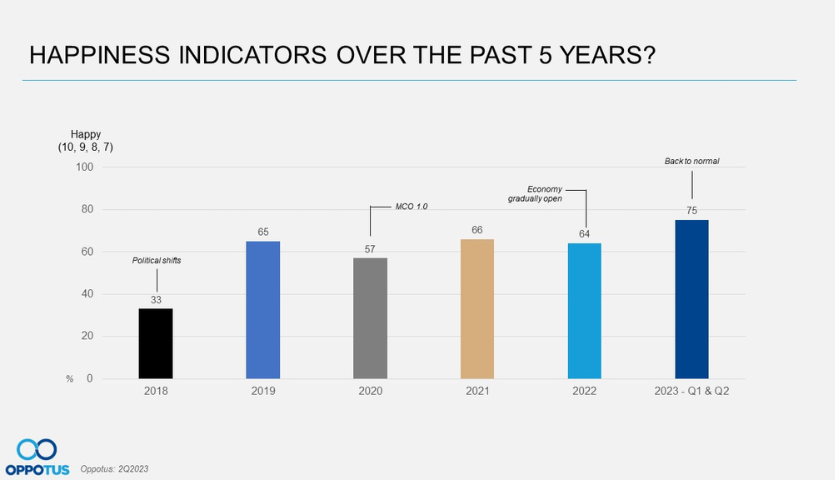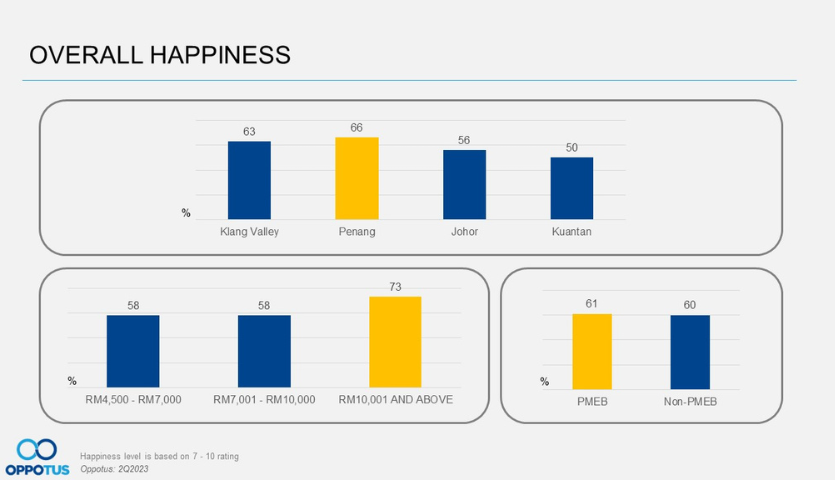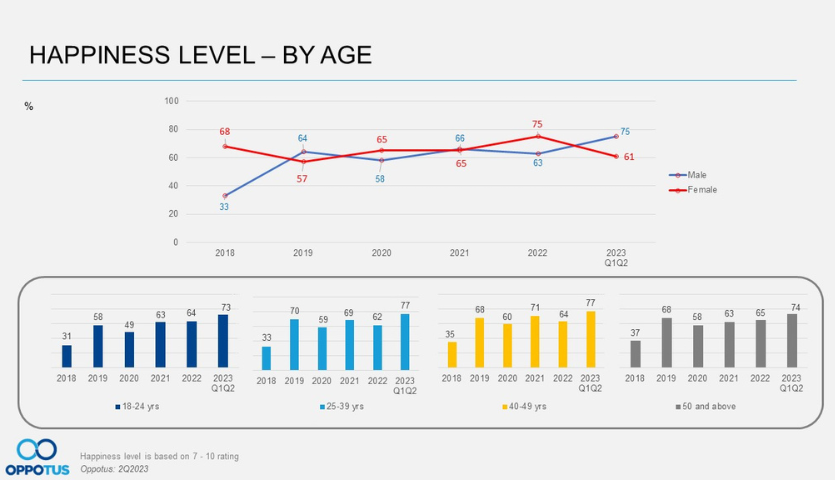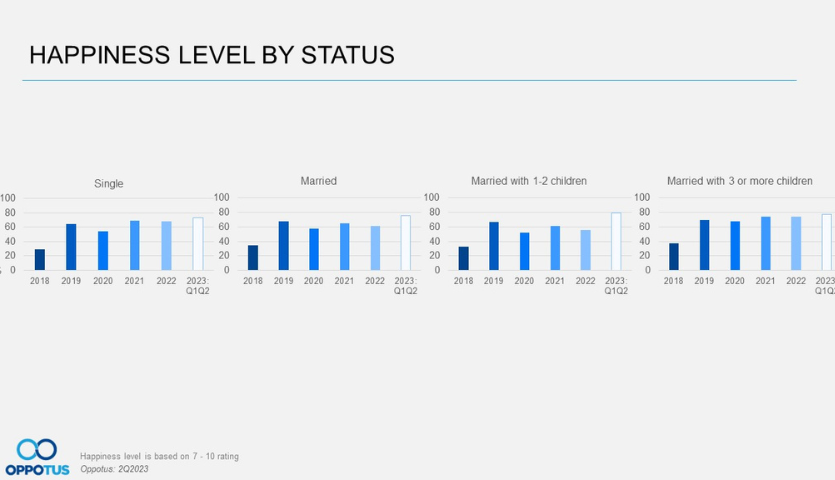2023 has been the first year of the post-pandemic era where we’ve had a full year free of any socioeconomic restrictions, and small and medium-sized enterprises (SMEs) remain vital in the recovering yet vibrant landscape of Malaysia’s business ecosystem. Accounting for 38.4% of the national GDP and providing employment for 48.2% of all working adults, the importance of SMEs is enormous yet still somewhat underappreciated to the general public. Besides their day-to-day operations soldiering on as successful businesses, SMEs also face a unique set of challenges beyond just generating revenue while providing a myriad of other benefits for their community.
In this report we will explore the intricate relationship between SMEs, their workforce, and the broader communities they serve, taking a closer look at the multifaceted challenges faced by SMEs in Malaysia and shedding light on the impact they have on the happiness and mental health of Malaysians.

To start with, how happy have Malaysians been over the past five years? 2018 was the lowest point for our collective happiness amidst political shifts and economic uncertainty, but things have improved significantly in the years since then. 2020 represented the 2nd lowest level of happiness in the past five years with the start of the COVID-19 pandemic and the heavy restrictions of MCO 1.0, but things have gotten better since then as we gradually returned to normal, with happiness levels rising to an average of 75% as of the first half of this year.
The Direct Impact

So how exactly have the activities of SMEs been tied to the happiness of Malaysians? While they are often the lifeblood of local economies, the pressures of running SMEs, from financial strains to operational challenges, can weigh heavily on both business owners and their employees. The demands of entrepreneurship including financial worries, long working hours, and the constant adaptation to changing market conditions can lead to significant stress and mental health challenges for business owners. This stress can trickle down to employees who may have to face worries about their job security and increased workloads/overtime.
On the other hand, successful SMEs can foster a sense of pride and achievement among business owners and employees, contributing positively to their well-being beyond simply being a means of making a living. When looking at the direct impact of SMEs in the context of happiness in the past five years, we can’t ignore the fact that the low point in 2020 was when SMEs were facing arguably their toughest period in recent memory due to the lockdown. While all businesses were affected significantly by the pandemic, SMEs lack resources in comparison to larger multinational companies (MNCs) which made it even more difficult for them to pivot in order to comply with restrictions. As a result, many SMEs were forced to close outright as they either lacked options for new operating procedures under the pandemic, or didn’t have the financial backing to enable them to survive through long periods of closure/restrictions. With SMEs contributing to the livelihood of so many Malaysians, their struggle during the MCO period would have been a major factor affecting the overall happiness of the population.
Looking at the Happiness of the Malaysian Population

Looking at overall happiness for different groups of people based on location, salary and occupation, we found that Penang was overall the happiest state, while those with a household income of RM10,001 and above were significantly happier than those in lower income brackets. On the other hand, the PMEB and Non-PMEB have been more or less equally happy.

Looking at happiness levels by gender and age, we found that males were significantly unhappier than females in 2018, but have improved to the point that they are experiencing their highest level of happiness in the past five years as of 2023 with a happiness level of 75%. Meanwhile, the female demographic has been experiencing ups and downs over the past 5 years, with happiness levels dropping from 75% all the way to 61% over the past year.
As for the different age groups, those who are 50 and above have been consistently around the same level of happiness since 2019, and although 2018 was the worst year across the age groups, the impact of the pandemic in 2020 appears to have been much harsher on the younger generation, whose happiness levels dropped to 49% during that period whilst those who are 50 and above only experienced a drop to 58%.

Finally, looking at the happiness levels by status of the population over the past 5 years, it appears that people who are married with 3 or more children have generally been happier even before, throughout, and after the pandemic. This may have been because these families were in a unique position that allowed for potentially greater happiness and resilience during these challenging times. With three children, family members were more likely to have available companions from day to day, reducing the feelings of isolation and boredom that affected many households. The additional number of children may also have provided additional support for the family as the siblings could bond and provide emotional support to one another, alleviating some of the burdens on parents.
The Community Connection

Looking at the differences between the happiness levels of different statuses, we then begin to see how SMEs play a vital role in not only driving economic growth but also in uplifting the collective mood and fostering supportive environments within their communities. Just like how having more close-knit family members around can have a positive impact on a person’s well-being, SMEs often have a more intimate and close-knit atmosphere which allows for a sense of camaraderie and shared purpose among employees. In many cases, SMEs are more responsive to the well-being needs of their staff and customers, as they can adapt more swiftly to changing circumstances. Having fewer layers of organisation and hierarchy between business owners and their staff also leads to more personalised interactions and a strong sense of community, so both employees and customers end up feeling more like they are cared for and that their well-being matters.
Moreover, many SMEs are deeply embedded in their local communities, engaging in philanthropic activities and contributing to social causes, which can have a positive impact on the overall well-being of the population they serve. During the lockdown periods, many forward thinking SMEs introduced initiatives to support their employees throughout the difficult times, such as online mental health seminars and encouraging team leaders to check in frequently with their team members to keep an eye on their well-being. By creating supportive environments for their employees, SMEs were able to continue contributing positively to their communities, fostering a sense of connection and support that might have helped to uplift the collective mood.
Opportunity For Positive Change

Speaking of initiatives, as we continue into the future, SMEs will have the opportunity to lead the way forward in driving positive change by prioritising initiatives that will raise awareness regarding mental health, cultivating positive work environments, and providing different benefits for the well-being of employees and communities.
Providing access to mental health resources, such as counseling services or stress management programs can help employees cope with the pressures of work and personal life, and SMEs investing in these mental health initiatives within the workplace can lead to increased productivity, reduced absences, and improved morale among employees, which will lead to an overall increase in happiness among Malaysians considering the huge amount of hours we rack up at work over the course of a year.
Furthermore, SMEs fostering positive work environments and emphasising the well-being of employees will lead to the creation of inclusive, supportive, and respectful workplaces which will be much more likely to have engaged and satisfied employees. This also enhances teamwork, productivity and innovation, not only boosting the happiness of employees but leading to broader economic benefits for Malaysia as SMEs and their employees continue to thrive. As a matter of fact, they have been shown to be doing just that as of late, with SMEs displaying a growth of 11.6% in their contribution to Malaysia’s GDP in 2022.
Lighting the Way Forward With Govt. and Policies

In 2023, SMEs appear set to light the way forward for Malaysia’s economy, and the government has been on board with assisting SMEs in creating better working environments and pushing innovation and economic growth. The Ministry of Finance has stated that the government will focus on SMEs in the 2024 national budget, with domestic direct investment being chosen by the prime minister as one of the key performance indicators. If this is implemented, it will encourage SMEs to continue to innovate and improve their working environments and foster a thriving SME landscape.
As of now, the government has provided grants to assist SMEs such as the SME Digitalisation Grant 2023 which aims to help SMEs to implement digital tools such as electronic point of sale systems, digital marketing, e-commerce and remote working tools, which are becoming increasingly crucial for success in a market that is constantly evolving in it’s degree of overall digitization along with the accompanying expectations from customers who are seeking the most convenient ways to conduct transactions.
The government has also provided support for female entrepreneurs through programs such as Terkunita TEKUN, and Dananita MARA, which has helped to empower women in the SME sector – an endeavor which may be key for improving the happiness of malaysians considering that female citizens were seen to have a lower level of happiness in 2023 so far.
Finally, with government incentives such as tax breaks or grants for SMEs that implement mental health programs, the government can encourage businesses to continue to invest in their employees’ well-being. Public-private partnerships can also be forged to provide cost-effective mental health services, training, and resources to SMEs, ensuring accessibility for businesses of all sizes. Furthermore, community-driven initiatives such as mental health clinics or days/festivals to raise awareness can thrive with government backing, fostering a culture of well-being and support that extends well beyond the workplace and into the community. This collaborative approach not only improves the mental health of SME owners and their employees but also creates a more vibrant and joyful SME landscape, ultimately contributing to a happier Malaysia where individuals, businesses, and communities flourish together.
For a deeper look into the happiness levels of Malaysians and the SME landscape in Malaysia, feel free to contact us at theteam@oppotus.com


